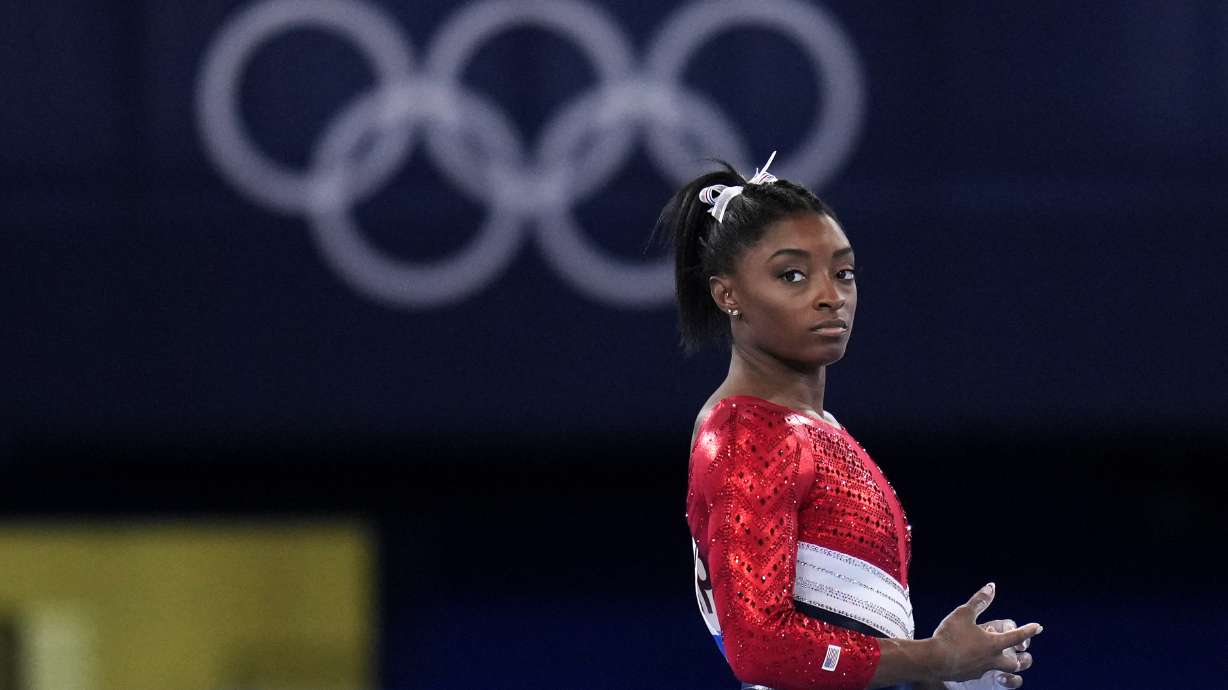Estimated read time: 5-6 minutes
This archived news story is available only for your personal, non-commercial use. Information in the story may be outdated or superseded by additional information. Reading or replaying the story in its archived form does not constitute a republication of the story.
SALT LAKE CITY — One of the best things athletes, coaches and society can do to help prevent and treat mental illness in sports is to get rid of the stigma surrounding it.
And, said Dr. Jason Hunziker, that's exactly what Simone Biles did by withdrawing from the final individual all-around competition at the Tokyo Olympic Games.
Hunziker — a leading sports psychiatrist and division chief of adult psychiatry at Huntsman Mental Health Institute — recently participated in an international think tank on athlete mental health and helped draft recommendations specific to Olympic athletes. He stated that Biles, the most decorated American gymnast and defending Olympic champion, "should be a model for the rest of us" that "it's OK to step back and take inventory."
"I've been around since before the Huntsman Mental Health Institute was the Huntsman Mental Health Institute, and I can say that one of the things we're trying the most to attack is stigma," he said.
Hunziker stressed that although athletes vigorously train their minds as well as their bodies and are mentally tough, their minds can sometimes get injured just like their bodies can sometimes get injured — and society should think of it the same way.
"There are more opportunities for athletes to have mental injuries just by the nature of being an athlete," he told KSL.com. "They spend their entire life perfecting this sport they participate in."
The stress, the pressure, the audience and many other factors combine with the athletes' youth and isolation from their friends and family during training and competition to create an atmosphere that can weigh on athletes. Add a pandemic and an Olympics very different from past Olympics, and it became a perfect storm for Biles and others.
And failure at this high level of performance can lead to disappointment, shame, embarrassment and even existential crises to the point of declining function. Part of the problem, he added, is that we see the perfection of what these athletes can do and begin to think of them as Olympians — godlike — rather than the human beings they are.
Michael Phelps said something similar when asked about Biles in an NBC interview Tuesday.
"We're humans, right? We're human beings. Nobody is perfect so yes, it is OK to not be OK. It's OK to go through ups and downs and emotional roller coasters," Phelps said. "But I think the biggest thing is we all need to ask for help sometimes, too, when we go through those times. For me, I can say personally it was something very challenging. It was hard for me to ask for help."
Phelps, as one of the most decorated Olympians of all time, has struggled with depression and suicidal ideation. He said Biles' story "broke my heart."
And Biles isn't the only young woman of color to step away from a sports competition recently. Naomi Osaka, half Haitian and half Japanese and largely considered to be one of the greatest tennis players in the world, stepped away from the Grand Slam earlier this year to focus on her mental health.
Although Black women don't necessarily have more disposition to mental illness, its stigma particularly affects them and keeps them from getting help, Mia Moore Kirby, an assistant professor in social work and the Center for African American Studies at the University of Texas at Arlington told the "Today" show in 2020.
"The 'strong Black woman concept' (implies that) we're able to handle all things and so sometimes clinicians — who may not be culturally competent — may also speak that language," Kirby said. "That's not validating a person's experience, not empathizing with what's going on and maybe minimizing their symptoms. And I think African American women, in particular, have symptoms minimized. We're looked at as superhuman."
There are certain risk factors that make mental illness more likely. Some of these are stressful life situations, traumatic experiences and previous mental illness. In Biles' case, she was regularly competing in front of the world doing highly elaborate routines. She has also experienced sexual trauma that was connected to the very sport she was competing in. In 2016, she admitted that she has ADHD and has taken medication for it since she was a child. All of these factors combined put her at high risk for mental illness.
And mental illness is not necessarily the same as the mental toll athletic performance can take, Hunziker said. Sports psychology can involve working through stress and shame, but mental illness often involves psychotherapy, medication and even hospitalization. In order for athletes to be mentally healthy, they need to get the treatment necessary in both areas.
Hunziker said that we all could look back and see her mental health declining as the pressure built up. "We read about it for weeks," he said.
On Monday, Biles posted on social media that she felt the weight of the world on her shoulders. Then, during her time vaulting for the team finals, the Olympian who had done this move many times in preparation for the moment left out a twist before the landing.
As for the backlash from some public figures saying that she failed her country, Hunziker said that they are representing the damaging stigma that keeps people from seeking help. Taking herself out of the competition in order to focus on her health was advocating for what she needed and removing the stigma for other athletes and everyone else by talking about it, he continued.
"It was a bold and courageous move," he said.
Correction: An earlier version identified Hunziker as a psychologist instead of a psychiatrist.









